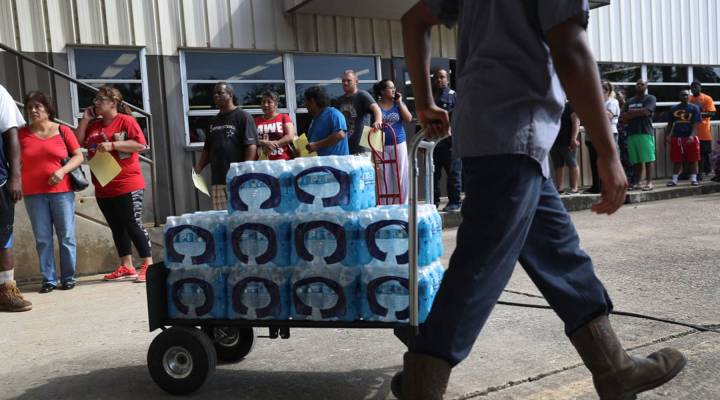
Economists don’t think price gouging is a problem. But what about our social values?
Economists don’t think price gouging is a problem. But what about our social values?

Charging flood victims $30 for a case of water or $10 for a gallon of gas doesn’t sit right.
And a majority of states, including Texas, have laws against price gouging. The state attorney general has threatened to prosecute people who jack up their prices in the wake of the flooding caused by Harvey. He said his office has received hundreds of reports of profiteering.
But most economists think those high prices can actually benefit communities during a crisis. Sky-high prices are the market at work, the basic laws of supply and demand in action.
“Price gouging laws stand in the way of the normal workings of competitive markets,” explained Michael Salinger, an economics professor at Boston University and former director of the Bureau of Economics at the Federal Trade Commission.
To make his point, Salinger recounted a “Dennis the Menace” cartoon he remembers from his childhood.
Dennis asked his father what causes tides. “The moon”, his father answered. Dennis offered up another explanation, that the tides were caused a big whale in the ocean. When the whale swishes his tail one way, the tide goes in, and when he swishes his tail the other way, the tide goes out.
“You don’t really believe that?” asked the father. “No,” said Dennis, “but it makes a lot more sense than the moon.”
Salinger said letting the markets work, allowing price hikes during disasters is the moon answer. It isn’t intuitive, he said, but it’s right.
| How companies are helping with Hurricane Harvey relief efforts |
| Hurricane Harvey flooding dredges up scams |
| You’re price gouging? Thank you very much |
There are a couple of reasons economists don’t like laws against price gouging.
On the demand side, laws that keep prices artificially low can encourage overbuying. They benefit the people who get to the store first.
“If prices don’t rise,” explained Texas Tech economics professor Michael Giberson, “they just get plenty.”
If water is cheap, I might be tempted to buy as much as I can jam in my car — just in case. If, on the other hand, prices shoot up, Giberson said, “it encourages consumers to be a little more careful in using the goods.”
There’s also a supply-side argument that economists make.
“When the price of vital goods go up in an area affected by an emergency, that sends a signal by areas not affected by the emergency to bring more,” explained Matt Zwolinski, director of the University of San Diego’s Center for Ethics, Economics, and Public Policy.
Zwolinski argues that the practice of price gouging can actually be admirable from a purely moral perspective: “It allocates goods and services in a way that best meets human needs.”
But, as with so much of economics, there is disagreement.
What are economists missing when they make these arguments?
“They are misunderstanding that if you piss people off, you pay a price,” said Richard Thaler, an economist at the Booth School of Business at the University of Chicago. Thaler co-wrote a well-known paper on price gouging that looked at what people think is fair.
It begins with the following scenario: A hardware store has been selling snow shovels for $15, and the morning after a blizzard, it raises the price to $20.
Thaler and his colleagues asked people if they thought that was fair.
“And people hate it,” he said. “They all think that’s a terrible idea.”
Thaler argued that any business that wants to still be in business tomorrow shouldn’t raise prices, because when it’s time to rebuild, no one is going to want to buy new flooring from the guy that sold them the generator for double the normal rate.
Businesses and economists should pay more attention to our shared social values, argued Thaler. “During a time of crisis, it’s a time for all of us to pitch in, it’s not a time for us to grab.”
We have to think beyond the laws of supply and demand, he said, beyond pure economics.
There’s a lot happening in the world. Through it all, Marketplace is here for you.
You rely on Marketplace to break down the world’s events and tell you how it affects you in a fact-based, approachable way. We rely on your financial support to keep making that possible.
Your donation today powers the independent journalism that you rely on. For just $5/month, you can help sustain Marketplace so we can keep reporting on the things that matter to you.


















